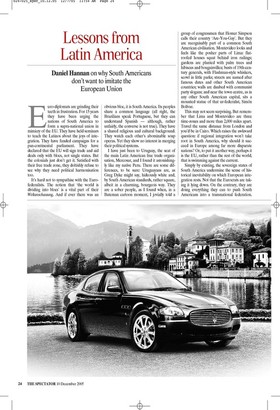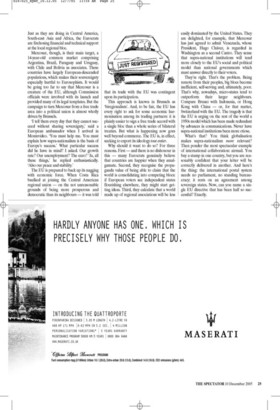Lessons from Latin America
Daniel Hannan on why South Americans don’t want to imitate the European Union Euro-diplomats are grinding their teeth in frustration. For 15 years they have been urging the nations of South America to form a supra-national union in mimicry of the EU. They have held seminars to teach the Latinos about the joys of integration. They have funded campaigns for a pan-continental parliament. They have declared that the EU will sign trade and aid deals only with blocs, not single states. But the colonials just don’t get it. Satisfied with their free trade zone, they doltishly refuse to see why they need political harmonisation too.
It’s hard not to sympathise with the Eurofederalists. The notion that ‘the world is dividing into blocs’ is a vital part of their Weltanschauung. And if ever there was an obvious bloc, it is South America. Its peoples share a common language (all right, the Brazilians speak Portuguese, but they can understand Spanish — although, rather unfairly, the converse is not true). They have a shared religious and cultural background. They watch each other’s abominable soap operas. Yet they show no interest in merging their political systems.
I have just been to Uruguay, the seat of the main Latin American free trade organisation, Mercosur, and I found it astonishingly like my native Peru. There are some differences, to be sure: Uruguayans are, as Greg Dyke might say, hideously white and, by South American standards, rather square, albeit in a charming, bourgeois way. They are a sober people, as I found when, in a Bateman cartoon moment, I jovially told a group of congressmen that Homer Simpson calls their country ‘Are-You-Gay’. But they are recognisably part of a common South American civilisation. Montevideo looks and feels like the posher parts of Lima: flatroofed houses squat behind iron railings; gardens are planted with palm trees and hibiscus and bougainvillea; busts of 19th-century generals, with Flashman-style whiskers, scowl in little parks; streets are named after famous dates and other South American countries; walls are daubed with communist party slogans; and near the town centre, as in any other South American capital, sits a mounted statue of that ur-federalist, Simón Bolívar.
This may not seem surprising. But remember that Lima and Montevideo are three time-zones and more than 2,000 miles apart. Travel the same distance from London and you’d be in Cairo. Which raises the awkward question: if regional integration won’t take root in South America, why should it succeed in Europe among far more disparate nations? Or, to put it another way, perhaps it is the EU, rather than the rest of the world, that is swimming against the current.
Simply by existing, the sovereign states of South America undermine the sense of historical inevitability on which European integration rests. Not that the Eurocrats are taking it lying down. On the contrary, they are doing everything they can to push South Americans into a transnational federation. Just as they are doing in Central America, South-east Asia and Africa, the Eurocrats are firehosing financial and technical support at the local regional bloc.
Mercosur, though, is their main target, a 14-year-old common market comprising Argentina, Brazil, Paraguay and Uruguay, with Chile and Bolivia as associates. These countries have largely European-descended populations, which makes their souvereignty especially hurtful to Eurosophists. It would be going too far to say that Mercosur is a creature of the EU, although Commission officials were involved with its launch and provided many of its legal templates. But the campaign to turn Mercosur from a free trade area into a political union is almost wholly driven by Brussels.
‘I tell them every day that they cannot succeed without sharing sovereignty,’ said a European ambassador when I arrived in Montevideo. ‘You must help me. You must explain how supra-nationalism is the basis of Europe’s success.’ What particular success did he have in mind? I asked. Our growth rate? Our unemployment? The euro? ‘Ja, all these things,’ he replied enthusiastically. ‘Also our peace and stability.’ The EU is prepared to back up its nagging with economic force. When Costa Rica baulked at joining the Central American regional union — on the not unreasonable grounds of being more prosperous and democratic than its neighbours — it was told that its trade with the EU was contingent upon its participation.
This approach is known in Brussels as ‘biregionalism’. And, to be fair, the EU has every right to ask for some economic harmonisation among its trading partners: it is plainly easier to sign a free trade accord with a single bloc than a whole series of bilateral treaties. But what is happening now goes well beyond commerce. The EU is, in effect, seeking to export its ideology tout entier.
Why should it want to do so? For three reasons. First — and there is no dishonour in this — many Eurocrats genuinely believe that countries are happier when they amalgamate. Second, they recognise the propaganda value of being able to claim that the world is consolidating into competing blocs: if European voters see independent states flourishing elsewhere, they might start getting ideas. Third, they calculate that a world made up of regional associations will be less easily dominated by the United States. They are delighted, for example, that Mercosur has just agreed to admit Venezuela, whose President, Hugo Chávez, is regarded in Washington as a second Castro. They sense that supra-national institutions will tend more closely to the EU’s social and political model than national governments which must answer directly to their voters.
They’re right. That’s the problem. Being remote from their peoples, big blocs become inefficient, self-serving and, ultimately, poor. That’s why, nowadays, micro-states tend to outperform their larger neighbours. Compare Brunei with Indonesia, or Hong Kong with China — or, for that matter, Switzerland with the EU. The tragedy is that the EU is urging on the rest of the world a 1950s model which has been made redundant by advances in communications. Never have supra-national institutions been more otiose.
What’s that? You think globalisation makes supra-nationalism more relevant? Then ponder the most spectacular example of international collaboration: airmail. You buy a stamp in one country, but you are reasonably confident that your letter will be correctly delivered in another. And here’s the thing: the international postal system needs no parliament, no standing bureaucracy; it rests on an agreement among sovereign states. Now, can you name a single EU directive that has been half so successful? Exactly.


























































 Previous page
Previous page